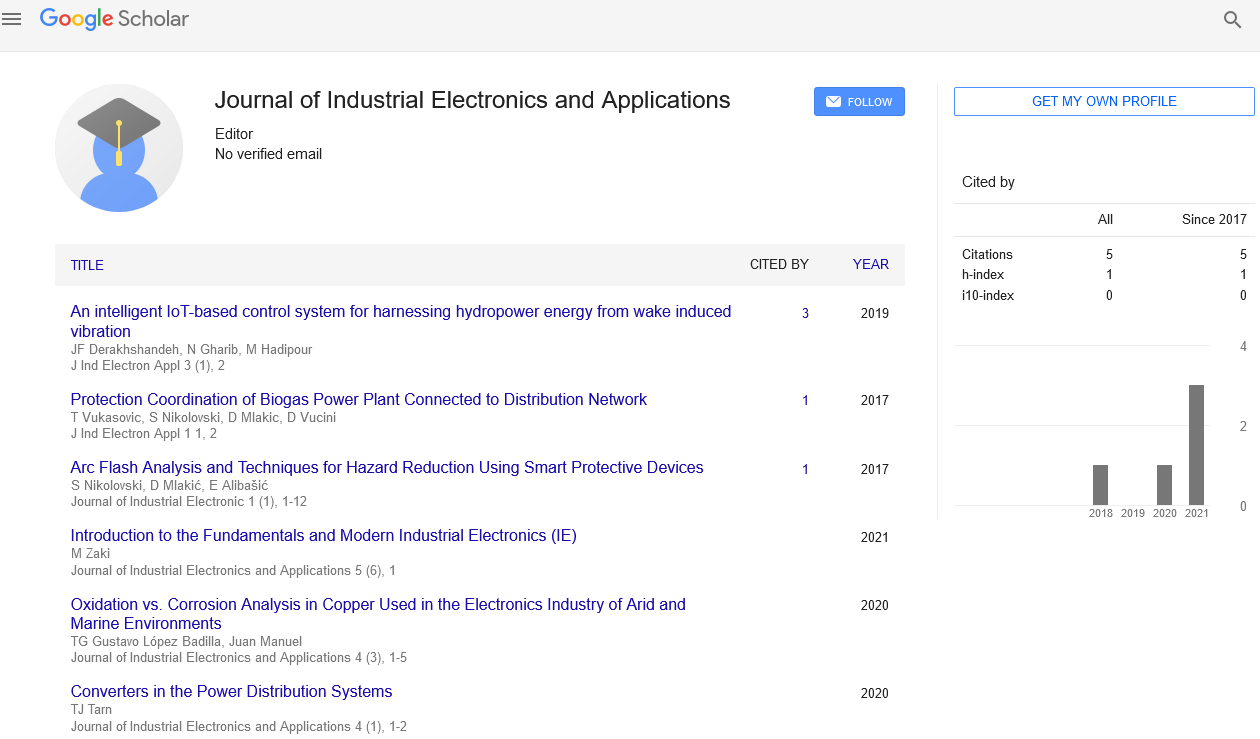Opinion Article, J Ind Electron Appl Vol: 7 Issue: 4
An In-Depth Overview of Exploring the Concept of Industrial Cyber-Physical Systems
Chiara Ledoux*
1Department of Industrial Engineering, École Polytechnique de Montréal, Montréal, Canada
*Corresponding Author: Chiara Ledoux
Department of Industrial
Engineering, École Polytechnique de Montréal, Montréal, Canada
E-mail: tim.ledoux@polymtl.ca
Received date: 01 November, 2023, Manuscript No. JIEA-23-124010;
Editor assigned date: 03 November, 2023, PreQC No. JIEA-23-124010 (PQ);
Reviewed date: 20 November, 2023, QC No. JIEA-23-124010;
Revised date: 27 November, 2023, Manuscript No. JIEA-23-124010 (R);
Published date: 04 December, 2023, DOI: 10.36648/JIEA.1000049
Citation: Ledoux C (2023) An In-Depth Overview of Exploring the Concept of Industrial Cyber-Physical Systems. J Ind Electron Appl 7:4.
Abstract
In the era of Industry 4.0, Industrial Cyber-Physical Systems (ICPS) have emerged as a cornerstone of transformative technologies, seamlessly integrating the digital and physical elements of industrial processes. These systems represent a convergence of computational algorithms, networking capabilities, and physical processes, ushering in a new era of efficiency, flexibility, and connectivity in manufacturing and industrial operations.
Description
In the era of Industry 4.0, Industrial Cyber-Physical Systems (ICPS) have emerged as a cornerstone of transformative technologies, seamlessly integrating the digital and physical elements of industrial processes. These systems represent a convergence of computational algorithms, networking capabilities, and physical processes, ushering in a new era of efficiency, flexibility, and connectivity in manufacturing and industrial operations. This article explores the key features, applications, and implications of Industrial Cyber-Physical Systems.
Key features of industrial cyber-physical systems
ICPS leverage a network of sensors and actuators embedded in physical processes. These sensors collect real-time data on temperature, pressure, humidity, and other variables, while actuators enable the system to respond dynamically to the changing conditions. Connectivity is a fundamental aspect of ICPS, enabling seamless communication between physical components and the digital layer. This connectivity facilitates real-time data exchange, allowing for quick decision-making and adaptive control in industrial environments. The data generated by ICPS is processed through advanced analytics and machine learning algorithms. This analysis empowers the system to make informed decisions, optimize processes, and predict potential issues, enhancing overall operational efficiency. ICPS introduce adaptive control mechanisms that allow industrial systems to respond dynamically to changing conditions. This adaptability is crucial for optimizing performance, minimizing downtime, and ensuring the efficient use of resources.
Applications in industry
ICPS play a pivotal role in the implementation of smart manufacturing practices. Through real-time monitoring and control, these systems enable manufacturers to optimize production processes, reduce waste, and enhance product quality. The connectivity and datasharing capabilities of ICPS extend to supply chain management. Manufacturers can gain visibility into the entire supply chain, from raw material procurement to product delivery, facilitating better coordination and responsiveness. ICPS enable predictive maintenance by continuously monitoring the condition of industrial equipment. By analyzing sensor data, the system can predict when equipment is likely to fail, allowing for proactive maintenance to prevent costly downtime. Energy efficiency is a key focus in industrial settings, and ICPS contribute to optimized energy management. By analyzing energy consumption patterns and adjusting processes in real-time, these systems help industries reduce energy costs and minimize environmental impact.
Implications for the future
ICPS pave the way for increased automation in industrial processes. As these systems become more sophisticated, they can autonomously control and optimize various aspects of manufacturing, reducing the need for human intervention in routine tasks. The integration of digital components in industrial processes also brings forth cybersecurity challenges. Securing ICPS against cyber threats is crucial to prevent unauthorized access, data breaches, and potential disruptions to critical industrial operations. Achieving seamless interoperability between different ICPS and standardizing communication protocols are ongoing challenges. Industry stakeholders are actively working on establishing standards to ensure compatibility and facilitate the widespread adoption of these systems.
Conclusion
Industrial Cyber-Physical Systems represent a paradigm shift in industrial operations, offering unprecedented connectivity, adaptability, and efficiency. As industries continue to embrace the digital transformation, ICPS will play a central role in shaping the future of manufacturing, supply chain management, and beyond. While challenges such as cybersecurity and standardization remain, the potential benefits of ICPS in optimizing industrial processes and driving innovation are undeniable, marking a significant step forward in the evolution of smart and connected industries.
 Spanish
Spanish  Chinese
Chinese  Russian
Russian  German
German  French
French  Japanese
Japanese  Portuguese
Portuguese  Hindi
Hindi 